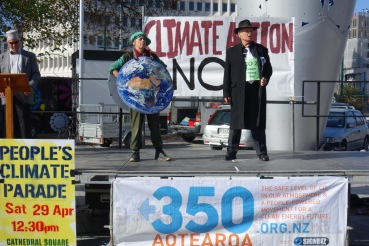 This weekend, hundreds of thousands marched in Washington and other cities to protest the Trump administration and its position on climate change. Like last weekend’s March for Science, this march has helped to reveal underlying ideological and scientific schisms.
This weekend, hundreds of thousands marched in Washington and other cities to protest the Trump administration and its position on climate change. Like last weekend’s March for Science, this march has helped to reveal underlying ideological and scientific schisms.
The day before the march, the New York Times’ Bret Stephens wrote an editorial arguing that, because climate science is uncertain and probabilistic rather than absolute, it is hubris rather than science that leads activists to loudly denounce any skepticism of their preferred policy.
Claiming total certainty about the science traduces the spirit of science and creates openings for doubt whenever a climate claim proves wrong. Demanding abrupt and expensive changes in public policy raises fair questions about ideological intentions. Censoriously asserting one’s moral superiority and treating skeptics as imbeciles and deplorables wins few converts.
None of this is to deny climate change or the possible severity of its consequences. But ordinary citizens also have a right to be skeptical of an overweening scientism. They know — as all environmentalists should — that history is littered with the human wreckage of scientific errors married to political power.
Ironically proving the article’s claim, many have loudly denounced the piece, called for Stephens’ firing, and have made a public showing of unsubscribing from the New York Times. It seems the first commandment of climate activism is “thou shalt not question the orthodoxy.”
That’s not to say that Bret Stephens hasn’t said plenty of things worth disagreeing with. But this is not the article to give this sort of reaction to. It doesn’t deny climate change. It just criticizes the closed-minded partisanship of its evangelists.
The reaction to this piece is disheartening for several reasons: Are we really so unable to tolerate exposure to opinions we disagree with? Have we become so accustomed to media outlets as partisan echo chambers that any divergence is unacceptable?
But the main reason the response is so discouraging is that it highlights a major reason why consensus and action on climate change is so difficult. It’s not solely the fault of climate “deniers,” though entrenchment on that side certainly has a share of the blame. But it also lies with climate evangelists.
The role of climate change deniers in obstructing any policy response is obvious. It’s also understandable. Someone who believes a policy is wrong-headed and will cause significant harm without fixing any real problem can’t be expected to support it. I’m sure much of that opposition is sincere and well intentioned.
But it’s also true that climate change challenges conservative and libertarian instincts in a way that makes it harder to believe the evidence, no matter how strong it is. On that point, a recent interview of the Niskanen Center’s Jerry Taylor—who made the conversion from prominent skeptic to activist—is uniquely insightful.
This is a significant problem, but it’s not unique to climate deniers. Climate evangelists likewise tend to embrace science and evidence when it confirms their prior political views and reject it otherwise.
For progressives and big-government liberals, climate change is easy to accept to the extent it seems to call out for a big-government solution. But even among climate evangelicals, where science and their prior political commitments conflict, politics usually win.
During yesterday’s march, I asked these questions on twitter:
Q for my #ClimateMarch friends: what gov policy that you used to oppose do you now support b/c of #climatechange? /1
— Jonathan Wood (@Jon_C_Wood) April 29, 2017
Q for my #ClimateMarch friends: what gov policy that you used to support do you now oppose b/c of #climatechange? /1
— Jonathan Wood (@Jon_C_Wood) April 29, 2017
It is hard to square climate alarmism with opposition to nuclear power—which can produce a significant amount of electricity with current technology while producing far fewer emissions than coal or natural gas. Speaking of natural gas, the switch from coal to natural gas—made possible by fracking—has likely been responsible for a third of the emissions reduction in the U.S. since 2007. But how many climate evangelicals also support government policies to eliminate both? And how many oppose government policies that restrict property rights and undermine the ability of people to adapt to a changing climate?
The disconnect between the asserted commitment to science over politics was on full display last election cycle when environmental groups lined up to oppose a revenue-neutral carbon tax initiative in Washington. As I explained at the time:
Environmental groups opposed the measure because, by being revenue neutral, it wouldn’t increase the size of government. Apparently, many “environmentalists” were only willing to consider solutions that would give the state a big pot of money to divvy up amongst their favorite cronies (subsidy-dependent renewable energy companies) and to spend on a whole host of unrelated progressive policy goals.
There are admirable examples from both sides of the political spectrum of people reconsidering their preconceived political notions in the face of climate change. There’s a growing number of libertarians and conservatives arguing for a response to climate change that minimizes growth in the size of government, relies on property rights, and respects individual liberty. There are also many praiseworthy environmentalists who have reconsidered old, entrenched positions on nuclear and other issues in light of climate change.
But so long as the most vocal climate change activists refuse to recognize the difference between science and their preferred policy responses—and the appropriateness of a healthy skepticism for both, but especially the latter—creating converts will continue to be the slow, thankless work of the climate center alone. Labeling as a “denier” anyone who questions the costs of climate policy, while politically convenient, is destroying any hope of a consensus and compromise.

